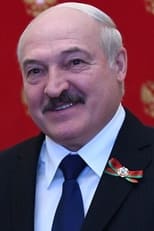Alexander Lukashenko
See more on
Acted in
Russia, China, Iran: The Axis of Revenge
2024
as Self (archive footage)
The Accidental President
2024
as Self
Country In Exile
2021
as Self (archive footage)
Lukashenko. Gold Bottom
2021
as Himself
Influence
2020
as Self - President of Belarus (archive footage)
Belarus: An Ordinary Dictatorship
2018
as Self (archive footage)
An Ordinary President
1996
as Self







